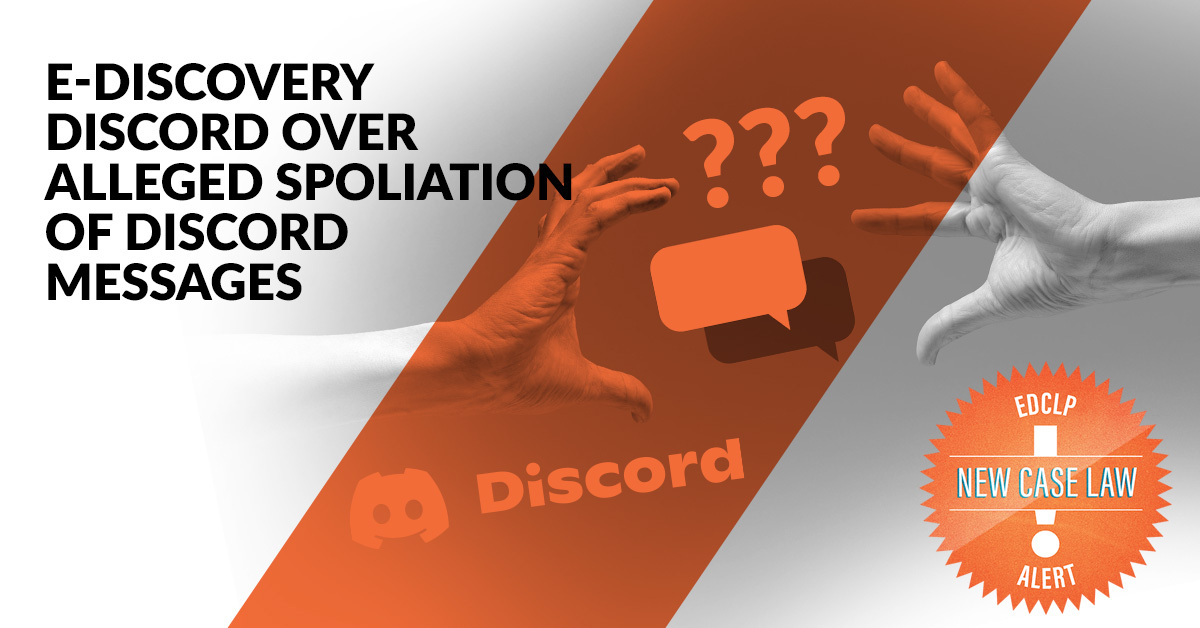E-Discovery
Case Law Alert: E-Discovery Discord over Alleged Spoliation of Discord Messages
March 21, 2023

While the plaintiff’s motion for spoliation sanctions in Carty v. Steem Monsters Corp. was ultimately denied by the bench, the fact that Discord channels were recognized as a communication channel requiring preservation once again reminds e-discovery professionals that they must keep up with emerging technologies or risk falling afoul of the courts.
Overview
This breach of contract case based on the operation of a digital card game called Splinterlands initiated in November 2020. In September of that year, plaintiff’s former counsel served attorneys for defendants with a “Notice to Preserve” letter covering “all paper and electronic records that are in any way related to Steem Monsters ..., Ste[e]m Engine Corp., and the involvement of [defendants] in those entities,” including “all emails, text messages, [and] chat records.”
Subsequently, plaintiff (one of the game’s co-founders) sought sanctions for spoliation of evidence against Defendants (the other co-founders) for messages and data allegedly removed from a Discord channel on or about January 15, 2022. The deleted information was “roughly five percent or less” of the defendants’ data present on Discord and from a year after both the initiation of the lawsuit and the preservation of ESI from the Discord server.
Plaintiff deposed one of the defendants on the issue of the spoliation. The testimony revealed that “on three separate occasions, an unknown bad actor or actors hacked into [Steem’s] Discord channel, resulting in three [message] threads… being deleted either by a moderator… or by the bad actor attempting to avoid detection.”
Ruling
- Spoliation not proven. Given that the defendants “produced more than 17,000 pages of Discord messages” and the timeline of the alleged spoliation, the judge ruled that the plaintiff had failed “to identify what relevant ESI would have been posted on that thread.”
- Failure to prove ESI was lost. Plaintiff did not present evidence of any attempts to obtain the information from the company that owns and operates Discord, which would be another potential source of the information, citing “no evidence that any [manipulation or falsification] has occurred in this case.”
- Burden on movant to demonstrate prejudice or intent to deprive. The judge cited FRCP 37(e) to explain that sanctions on failure to preserve can only be issued if the movant can demonstrate prejudice or intent to deprive the opponent access to the ESI.

Expert Analysis from Hon. Andrew Peck (ret.), Senior Counsel, DLA Piper
The Court correctly analyzed Rule 37(e). Plaintiff showed that some data had been deleted from Discord, but not why it was relevant, since defendants had preserved the Discord messages before the later hacker activity. And there certainly was no evidence of intent to deprive. A party moving for spoliation sanctions should have evidence to satisfy Rule 37(e) and not just file the motion to embarrass the other party.
Case Law Tip
Want to learn more about recent e-discovery sanctions? Download the Exterro whitepaper, Don't Get Sanctioned Like These Parties!
